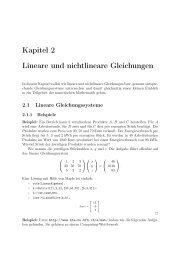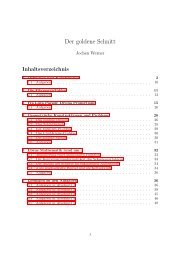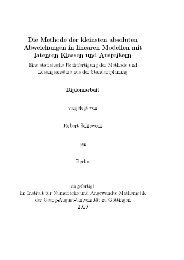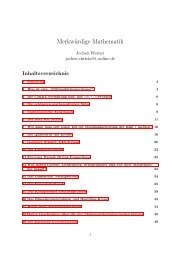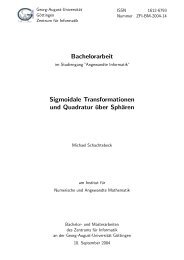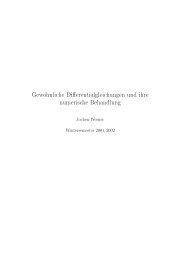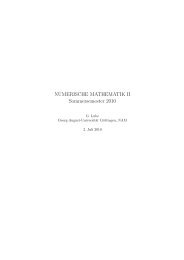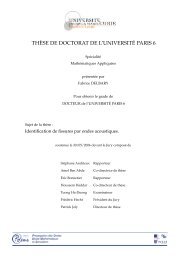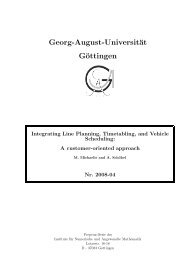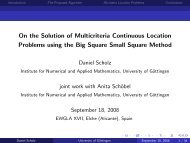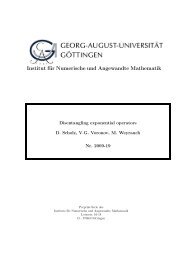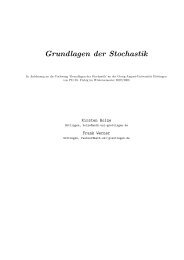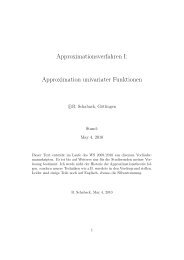BAIL 2006 Book of Abstracts - Institut für Numerische und ...
BAIL 2006 Book of Abstracts - Institut für Numerische und ...
BAIL 2006 Book of Abstracts - Institut für Numerische und ...
You also want an ePaper? Increase the reach of your titles
YUMPU automatically turns print PDFs into web optimized ePapers that Google loves.
F. NATAF, G. RAPIN: Application <strong>of</strong> the Smith Factorization to Domain Decomposition<br />
Methods for the Stokes equations<br />
✬<br />
✫<br />
Application <strong>of</strong> the Smith Factorization to Domain<br />
Decomposition Methods for the Stokes Equations<br />
FRÉDÉRIC NATAF, GERD RAPIN<br />
Laboratoire J. L. Lions, Université Pierre et Marie Curie, 75252 Paris Cedex 05,<br />
France; nataf@ann.jussieu.fr<br />
Math. Dep., NAM, University <strong>of</strong> Göttingen, D-37083, Germany;<br />
grapin@math.uni-goettingen.de<br />
In this talk the Smith factorization is used systematically to derive a new domain decomposition<br />
method for the Stokes problem. In two dimensions the key idea is the<br />
transformation <strong>of</strong> the Stokes problem into a scalar bi-harmonic problem. We show,<br />
how a proposed domain decomposition method for the bi-harmonic problem leads to<br />
a domain decomposition method for the Stokes equations which inherits the convergence<br />
behavior <strong>of</strong> the scalar problem. Thus, it is sufficient to study the convergence <strong>of</strong><br />
the scalar algorithm. The same procedure can also be applied to the three dimensional<br />
Stokes problem.<br />
As transmission conditions for the resulting domain decomposition method <strong>of</strong> the<br />
Stokes problem we obtain natural bo<strong>und</strong>ary conditions. Therefore it can be implemented<br />
easily.<br />
A Fourier analysis and some numerical experiments show very fast convergence <strong>of</strong><br />
the proposed algorithm. Our algorithm shows a more robust behavior than Neumann-<br />
Neumann or FETI type methods.<br />
The last decade has shown, that Neumann-Neumann type algorithms, FETI, and<br />
BDDC methods are very efficient domain decomposition methods. Most <strong>of</strong> the early<br />
theoretical and numerical work has been carried out for scalar symmetric positive definite<br />
second order problems, see for example [8, 5]. Then, the method was extended<br />
to different other problems, like the advection-diffusion equations [1], plate and shell<br />
problems [12] or the Stokes equations [10, 11].<br />
In the literature one can also find other preconditioners for the Schur complement<br />
<strong>of</strong> the Stokes equations (cf. [11, 2]). A more complete list <strong>of</strong> domain decomposition<br />
methods for the Stokes equations can be fo<strong>und</strong> in [10, 13]. Also FETI [6] and BDDC<br />
methods [7] have been applied to the Stokes problem with success.<br />
Our work is motivated by the fact that in some sense the domain decomposition<br />
methods for Stokes are less optimal than the domain decompoition methods for scalar<br />
problems. Indeed, in the case <strong>of</strong> two subdomains consisting <strong>of</strong> the two half planes it<br />
is well known, that the Neumann-Neumann preconditioner is an exact preconditioner<br />
for the Schur complement equation for scalar equations like the Laplace problem (cf.<br />
[8]). A preconditioner is called exact, if the preconditioned operator simplifies to the<br />
identity. Unfortunately, this does not hold in the vector case. It is shown in [9] that the<br />
standard Neumann-Neumann preconditioner for the Stokes equations does not possess<br />
this property.<br />
Our aim in this talk is the construction <strong>of</strong> a method, which preserves this property.<br />
Thus, one can expect a very fast convergence for such an algorithm. And indeed, the<br />
numerical results clearly support our approach. In this talk the ideas <strong>of</strong> [4] are extended<br />
Speaker: RAPIN, G. 124 <strong>BAIL</strong> <strong>2006</strong><br />
1<br />
✩<br />
✪



